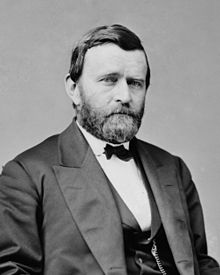Ulysses S. Grant presidential administration
| Presidency of Ulysses S. Grant | |
|---|---|

President Grant
Circa 1870 |
|
| 18th President of the United States | |
|
In office March 4, 1869 – March 4, 1877 |
|
| Vice President |
|
| Preceded by | Andrew Johnson |
| Succeeded by | Rutherford B. Hayes |
| Personal details | |
| Born |
Hiram Ulysses Grant April 27, 1822 Point Pleasant, Ohio, U.S. |
| Died | July 23, 1885 (aged 63) Wilton, New York, U.S. |
| Resting place |
General Grant National Memorial Manhattan, New York |
| Political party | Republican |
| Spouse(s) | Julia Grant (m. 1848) |
| Children | Frederick, Ulysses Jr., Nellie, and Jesse |
| Parents |
Jesse Root Grant Hannah Simpson |
| The Grant Cabinet | ||
|---|---|---|
| Office | Name | Term |
| President | Ulysses S. Grant | 1869–1877 |
| Vice President | Schuyler Colfax | 1869–1873 |
| Henry Wilson | 1873–1875 | |
| None | 1875–1877 | |
| Secretary of State | Elihu B. Washburne | 1869 |
| Hamilton Fish | 1869–1877 | |
| Secretary of Treasury | George S. Boutwell | 1869–1873 |
| William A. Richardson | 1873–1874 | |
| Benjamin H. Bristow | 1874–1876 | |
| Lot M. Morrill | 1876–1877 | |
| Secretary of War | John M. Schofield | 1869 |
| John A. Rawlins | 1869 | |
| William W. Belknap | 1869–1876 | |
| Alphonso Taft | 1876 | |
| J. Donald Cameron | 1876–1877 | |
| Attorney General | Ebenezer R. Hoar | 1869–1870 |
| Amos T. Akerman | 1870–1871 | |
| George H. Williams | 1871–1875 | |
| Edwards Pierrepont | 1875–1876 | |
| Alphonso Taft | 1876–1877 | |
| Postmaster General | John A. J. Creswell | 1869–1874 |
| James W. Marshall | 1874 | |
| Marshall Jewell | 1874–1876 | |
| James N. Tyner | 1876–1877 | |
| Secretary of the Navy | Adolph E. Borie | 1869 |
| George M. Robeson | 1869–1877 | |
| Secretary of the Interior | Jacob D. Cox | 1869–1870 |
| Columbus Delano | 1870–1875 | |
| Zachariah Chandler | 1875–1877 | |
The presidency of Ulysses S. Grant began on March 4, 1869, when he was inaugurated as the 18th President of the United States, and ended on March 4, 1877. Grant took office in the aftermath of the Civil War, and he presided over much of the Reconstruction Era. A Republican, Grant became president after defeating Democrat Horatio Seymour in the 1868 presidential election. He was reelected in 1872 in a landslide victory, overcoming a split in the Republican Party that resulted in the formation of the Liberal Republicans, which nominated Horace Greeley to oppose him. He was succeeded as president by Republican Rutherford B. Hayes after the contested 1876 presidential election.
Reconstruction after the Civil War took precedence during Grant's first term of office. By 1870, all former Confederate states had been readmitted into the United States and were represented in Congress, but the federal government remained active in the South to protect the rights of former slaves. Congress crafted three powerful Enforcement Acts and established the Department of Justice and the Office of Solicitor General. These actions bolstered the Grant Administration's ability to carry out and enforce federal laws, particularly those that protected the civil and political rights of African Americans. The new Justice Department prosecuted thousands of Ku Klux Klan members under the strict new laws, and Grant signed the Second Enforcement Act of 1871 into law, which made the Ku Klux Klan an illegal terrorist organization. Grant also supported passage of the Fifteenth Amendment (ratified on February 3, 1870, the third and last of the Reconstruction Amendments), which prohibits the federal and state governments from denying a citizen the right to vote based on that citizen's "race, color, or previous condition of servitude". Rather than develop a cadre of trustworthy political advisers, Grant was self-reliant in choosing his cabinet, while he relied heavily on former Army associates who had a thin understanding of politics and a weak sense of civilian ethics. There were numerous scandals, including allegations of bribery, fraud, and cronyism, as a result. In 1872, Grant signed into law an Act of Congress that established Yellowstone National Park, the nation's first National Park.
...
Wikipedia
